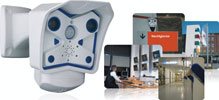

Surveillance technology makes economic as well as security sense.
Nobody likes to be in hospital, but knowing that you are in good hands makes everything a little easier. The patients at the Maria Hilf Clinics in Mönchengladbach can be sure of that. After all, each hospital that the clinic operates has a very thorough approach to patient care.
“We aim to provide each and every patient with the most modern medical treatment available,” said Stefan Bahun, head of security, while explaining the concept behind the Maria Hilf Clinics. “But we do not really want to focus on just the illness, we want to look at the whole person – along with the illness. That is why personal attention plays such an important role.”
The city hospital, with a total of 800 beds, admits approximately 28 000 patients and treats another 100 000 outpatients each year. Close to 1600 employees, including 190 doctors and 800 employees in nursing service make sure that the patients are well taken care of. As an academic teaching hospital, the Maria Hilf Clinics also train medical students.
Modern medical technology
Patients are treated according to the latest scientific findings and using the most modern medical technology. To improve the security of the patients and employees, the clinics have also put a particular focus on technology. Mobotix cameras provided constant monitoring of the gates and other critical points on the clinic premises.
“Personal care cannot be covered by usual medical insurance. But, in order to meet the standards of our humanitarian, personal approach, we have to work as profitably as possible in other areas,” said Stefan Bahun.
One area that was not operating economically in the past was the night-time gates. With lower visitor frequency and fewer emergencies or patients requiring transport compared to daytime, the night shift was not working to full capacity. That is when the idea was born to take advantage of technology and to centralise the night personnel at one of the three locations. The capacity that would be freed up this way could be invested in the day shift, which has had to master an ever-increasing number of tasks.
Controlled access
Access control at the locations without a gate-keeper in the night hours remained a problem. “It is still necessary for emergency services and patients to be able to enter the clinics at night. But we cannot simply leave the buildings open to anyone. And communication via an intercom system alone just does not do the job.” Bahun realised that this problem could only be solved by installing a powerful digital camera system. “Although we already had video technology, this analogue system proved unsuitable for what we really needed. And because the buildings were already equipped with a good computer infrastructure with a powerful network, we decided to take advantage of that for the camera solution.”
And so the search began for a system able to transmit optimum images with low data requirements. “This condition was a prerequisite because the point-to-point radio system is not able to accommodate larger files,” explained the head of security.
Then someone happened to stumble across Mobotix in the trade press. “I was fascinated by the many different features the cameras offer,” remembered Bahun. “And of course, we were particularly interested in cameras that allow excellent images even at night.”
Central monitoring
Obviously, this solution was a big hit with the customer. Today, there are a total of 14 Mobotix cameras in operation at the three Maria Hilf clinic locations, thus providing central monitoring for all the entrances and access points. Other critical points, such as the cash desks and banking machines or the waiting room in the emergency room, are also under the watchful eye of the front desk staff.
Thanks to event control, which can be activated via the predefined fields in each camera image, it is possible to identify and record specific events. For reasons of security and documentation, these images are stored for 72 hours and can only be viewed if further investigation is required. Consequently, each of the three locations has been equipped with its own image server, which takes over the storage function of the cameras.
| Tel: | +27 12 657 3600 |
| Email: | [email protected] |
| www: | www.iacontrol.co.za |
| Articles: | More information and articles about Industrial Automation & Control (IAC) |
© Technews Publishing (Pty) Ltd. | All Rights Reserved.